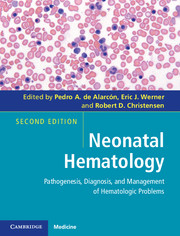Book contents
- Frontmatter
- Contents
- Contributors
- Foreword
- Preface
- 1 A historical review
- Section I Developmental hematology
- Section II Erythrocyte disorders
- Section III Platelet disorders
- 10 Fetal and neonatal immune thrombocytopenia
- 11 Acquired thrombocytopenia
- 12 Congenital thrombocytopenias and thrombocytopathies
- Section IV Leukocyte disorders
- Section V Immunologic disorders
- Section VI Hemostatic disorders
- Section VII Transfusional medicine
- Section VIII Miscellaneous
- Index
- Plate section
- References
11 - Acquired thrombocytopenia
from Section III - Platelet disorders
Published online by Cambridge University Press: 05 February 2013
- Frontmatter
- Contents
- Contributors
- Foreword
- Preface
- 1 A historical review
- Section I Developmental hematology
- Section II Erythrocyte disorders
- Section III Platelet disorders
- 10 Fetal and neonatal immune thrombocytopenia
- 11 Acquired thrombocytopenia
- 12 Congenital thrombocytopenias and thrombocytopathies
- Section IV Leukocyte disorders
- Section V Immunologic disorders
- Section VI Hemostatic disorders
- Section VII Transfusional medicine
- Section VIII Miscellaneous
- Index
- Plate section
- References
Summary
Introduction
Over the last decades, as the survival of neonates admitted to the neonatal intensive care unit (NICU) improved, thrombocytopenia has become an increasingly important problem in the care of sick term and particularly preterm neonates. In this population, the majority of thrombocytopenias are due to acquired, non-immune processes, and most resolve with time and/or treatment of the underlying illness. Frequently, however, the etiology of the thrombocytopenia poses a diagnostic dilemma, and – if severe enough – places the affected neonate at risk of bleeding.
In this chapter, we will focus exclusively on acquired, non-immune thrombocytopenias that present in the neonatal period. First, we will review the incidence of neonatal thrombocytopenia, and will propose a classification based on timing and clinical presentation. We will then discuss the mechanisms underlying some of the most common varieties of neonatal thrombocytopenia, and how the biological differences between neonatal and adult megakaryocytes might contribute to the susceptibility of neonates to develop thrombocytopenia. Finally, we will offer recommendations for the management of non-immune thrombocytopenia in neonates, and will discuss the risks and benefits associated with platelet transfusions and with the potential future use of novel thrombopoiesis-stimulating factors in this population. Immune and congenital causes of neonatal thrombocytopenia are discussed in detail in Chapters 10 and 12, respectively.
- Type
- Chapter
- Information
- Neonatal HematologyPathogenesis, Diagnosis, and Management of Hematologic Problems, pp. 157 - 171Publisher: Cambridge University PressPrint publication year: 2013

